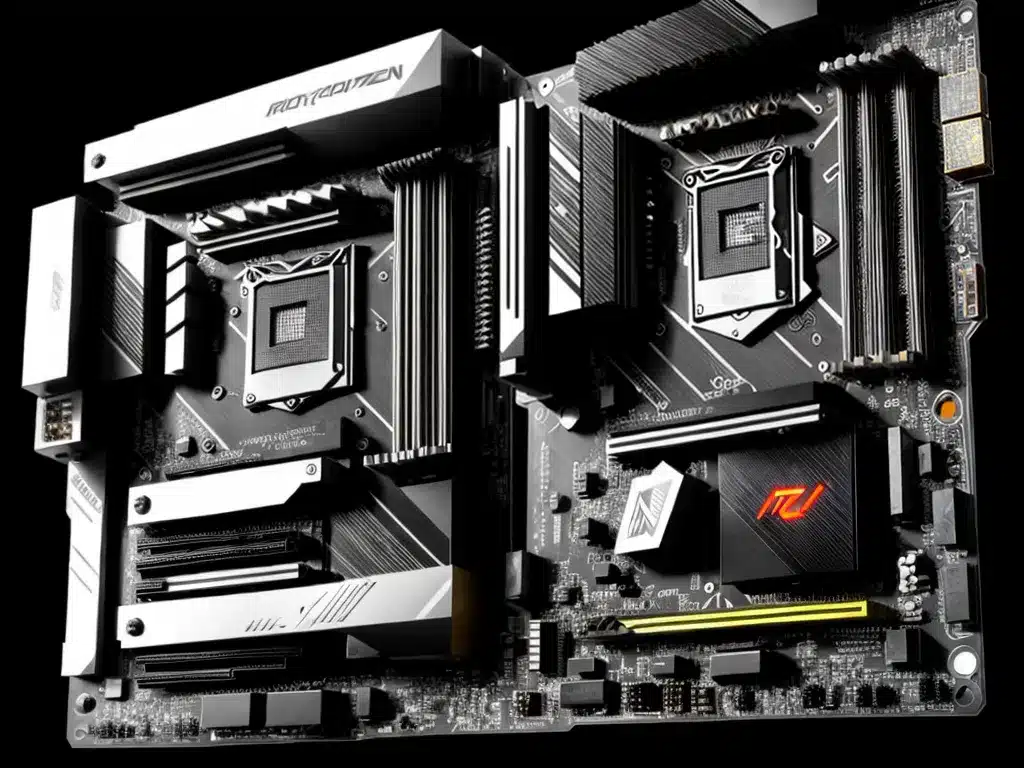

Introduction
Overclocking AMD Ryzen 7000 CPUs on B650 motherboards can provide excellent performance gains without breaking the bank. While X670 and X670E motherboards enable more aggressive overclocking, B650 models offer a budget-friendly option for enthusiasts. In this guide, I’ll provide tips on safely overclocking Ryzen 7000 processors on B650 motherboards and detail the performance you can expect.
B650 Chipset Overview
The B650 chipset was launched alongside AMD’s Ryzen 7000 desktop processors in late 2022. B650 motherboards provide a more affordable alternative to the high-end X670 and X670E chipsets, while still offering next-gen features like PCIe 5.0 support.
Key attributes of B650 motherboards include:
- DDR5 memory support up to DDR5-5200 speeds
- PCIe 5.0 x16 slot for graphics cards
- USB 3.2 Gen 2×2 ports for fast peripheral connectivity
- ** PCIe 4.0 lanes** for M.2 NVMe SSDs
- Overclocking support, but less robust than X670
The B650 chipset is ideal for mainstream users seeking solid productivity and gaming performance without spending more on extreme overclocking capabilities.
Ryzen 7000 Series Overview
The Ryzen 7000 desktop CPUs are built on AMD’s new Zen 4 architecture using the 5nm process node. Key improvements include:
- Up to 29% IPC (instructions per cycle) uplift over Zen 3
- Up to 5.7 GHz boost clocks on high-end models
- Support for DDR5 memory and PCIe 5.0
- Enhanced overclocking potential with Hybrid OC Switcher
Top SKUs like the 16-core Ryzen 9 7950X demonstrate excellent overclocking headroom beyond their stock settings. This makes B650 motherboards viable for overclocking Ryzen 7000 CPUs.
Overclocking on B650 Motherboards
While X670 boards enable more aggressive overclocking, B650 models still provide ample flexibility for tuning Ryzen 7000 chips. Here are some tips:
Update BIOS
Ensure you are running the latest BIOS for optimal performance, compatibility, and overclocking capabilities. AMD has refined memory profiles and voltages over various updates.
Enable PBO
Precision Boost Overdrive boosts multi-core performance by increasing power limits and thermal headroom for Ryzen CPUs. Enable PBO in your BIOS to start.
Adjust PBO Limits
You can fine-tune PBO behavior by increasing the Package Power Limits (PPT, TDC, EDC). This allows the CPU to sustain higher boost clocks for longer durations.
Try Auto OC
Many B650 boards provide an automated overclocking feature that tests your chip to assess stable settings. This presents a simple way to achieve gains.
Increase CPU Clock Multiplier
Manually raising the CPU clock multiplier incrementally can further boost frequencies while remaining stable. Monitor temperatures closely.
Tweak Memory Timings
Optimizing your DDR5 memory subtimings and voltages can also increase performance. Ensure stability through stress testing.
Expected Performance Gains
Overclocking a Ryzen 7000 CPU on a B650 motherboard can achieve:
- 5-15% higher multi-core Cinebench R23 scores
- 2-5% faster gaming fps in certain titles
- Lower rendering times in content creation workloads
Results will vary based on your specific CPU, motherboard model, and cooling solution. Top-tier chips like the 7950X will see bigger gains than mid-range options.
Is Overclocking Worth it?
For most users, overclocking Ryzen 7000 processors on B650 boards can provide noticeable real-world speedups in both productivity and gaming. It extends the longevity of your CPU. However, you must weigh the performance rewards against more complex cooling needs and total system power draw.
I recommend overclocking cautiously within safe temperature ranges. The stock settings of modern Ryzen CPUs are already optimized for efficiency and performance. But exploring your chip’s headroom can be rewarding when done properly!
Conclusion
While not as robust as X670, B650 motherboards provide ample capability for overclocking the latest Ryzen 7000 CPUs. Following basic guidelines, updating your BIOS, and incrementally testing voltages and frequencies allows you to achieve higher speeds with stability. Overclocking Ryzen 7000 chips on B650 boards can deliver excellent multifaceted performance gains.












